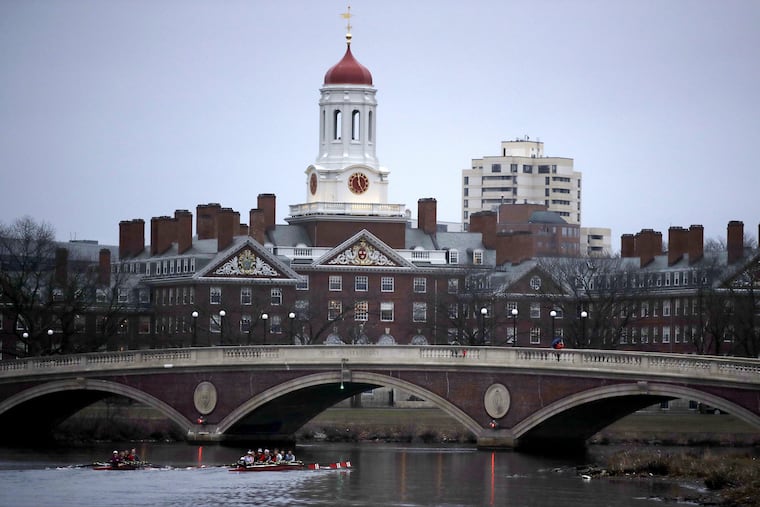As Harvard’s admissions face federal scrutiny, a reminder that grades aren’t everything | Opinion
It is in Harvard's best interest –and that of our country – to construct a student body that has the potential to give back to society in ways large and small.

The lawsuit against Harvard by an organization representing Asian American students got underway this week in a federal court in Boston.
The heart of the case is what criteria Harvard and other selective schools can consider in admissions. We believe that indicators beyond test scores and grades should be considered when constructing a class of students.
>> READ MORE: Want to get into Harvard? Trial sheds light on its preferred SAT score
Capacity to do the academic work at any prospective institution is a necessary condition for admission, but the overall aim for many institutions is to assemble a group of students who will contribute to a robust educational environment, and who will use the collegiate experience to excel as leaders in many spheres – including as entrepreneurs, innovators, artists, and scientists. Limiting admissions criteria to grades and scores runs the risk of keeping out many of these future leaders.
Moreover, grades and scores have been shown to be imperfect predictors of academic potential and are insufficient to distinguish strengths in domains outside test-taking.
According to research from the University of Pennsylvania's Angela Duckworth, non-IQ competencies, such as self-control and grit, are critical for future success. Additionally, Nobel Prize laureate James Heckman and other economists have documented that in addition to academic achievement, social and emotional skills are also key indicators.
Harvard and others thus rely on a "holistic" review of the application in order to assess qualities, such as self-discipline, integrity, helpfulness, courage, humility, and leadership. Students who wake early to help on a family farm, who work after school, who travel far to attend a selective high school, who shelve self-interest in order to lead a team or who take a stand on an ethical dilemma all have attributes that are not measured on a test but are certainly ingredients for success.
>> READ MORE: As Harvard battles claims of bias in its admissions, Princeton recalls its own test
Since there are no reliable standardized assessments of these skills and experiences, admissions officers examine letters of recommendation, personal essays, and informal assessments by those who have met the applicant. They also take into consideration the opportunities the applicant may have had – or not had – and what they achieved with what they were given. While this complicates the admissions process, assessing these harder-to-quantify qualities is critical for admitting a vibrant class that represents a portfolio of student talents, backgrounds, and aspirations.
The plaintiffs allege that Harvard discriminates against Asian Americans in these harder-to-quantify skills. Without question, if candidate ratings were rigged in a veiled attempt to discriminate, this should not be tolerated.
However, the empirical evidence does not provide convincing proof of discrimination. Harvard's expert analysis, which adjusts for factors such as the skills reflected in letters of recommendation by teachers and counselors, shows that Asian Americans were more likely to be admitted than others in four out of six years (though the
differences were not statistically significant). Even when one key measure of these non-academic factors is excluded, there is no statistical difference in the likelihood of admission between Asian Americans and others in five of six years. Overall, these results do not suggest systematic discrimination.
>> READ MORE: I'm an activist for Asian Americans. I support affirmative action | Opinion
As economists, we think the data speak for themselves. That's why we and other economists filed an amicus brief challenging the methodology of the plaintiff's expert witness and supporting the statistical analysis of the defendant's witness. As educators, we also think it is important that universities have autonomy to admit students that they anticipate will thrive given institutional mission, values, and curricula. Discretion is not discrimination. And it is the responsibility of university leaders to ensure that the admissions process is of the highest integrity and absent discrimination.
It is not in Harvard's best interest to discriminate, because excluding talented students would compromise its position as one of the world's best universities. It is in Harvard's best interest – and that of our country – to construct a student body that has the potential to give back to society in ways large and small. If our institutions of higher education are to continue educating the leaders of tomorrow, it is critical that their students reflect all dimensions of talent among young people today.
Cecilia Elena Rouse is dean of the Woodrow Wilson School of Public and International Affairs at Princeton University. Sarah Turner is a professor of economics and education at University of Virginia.